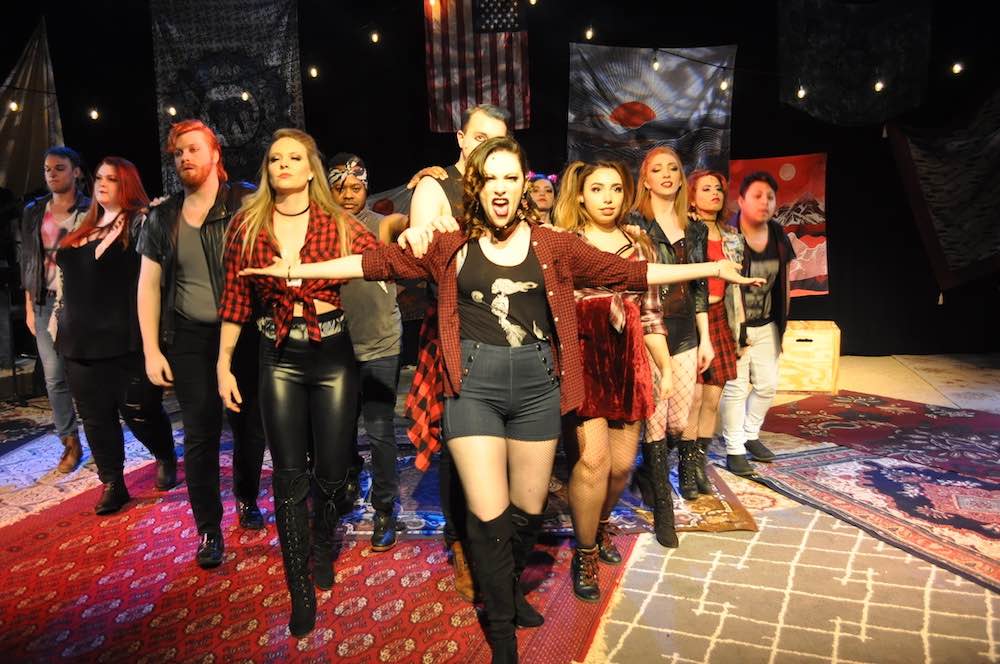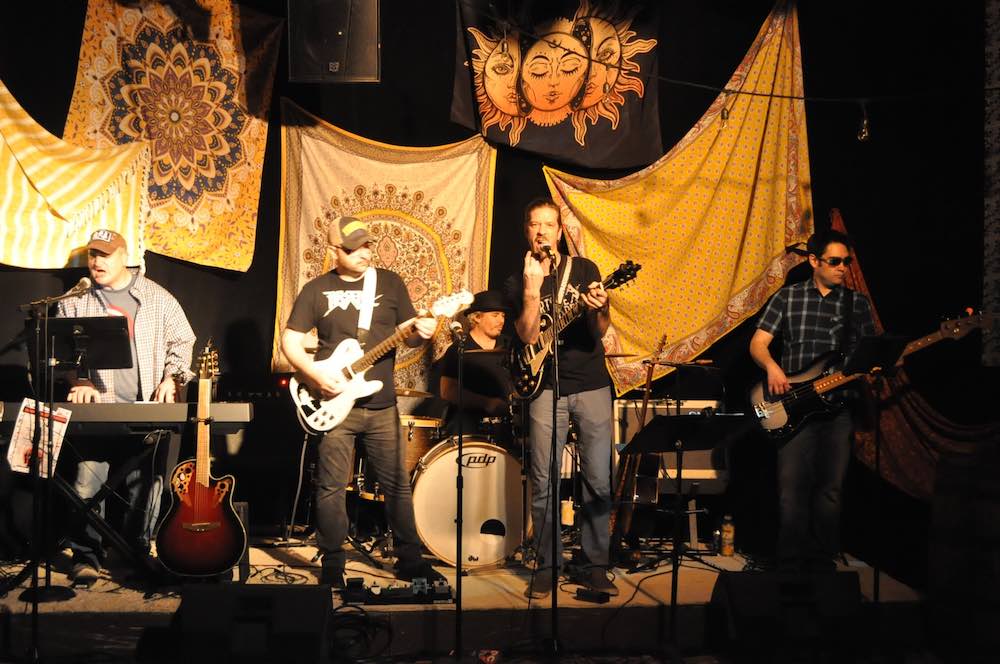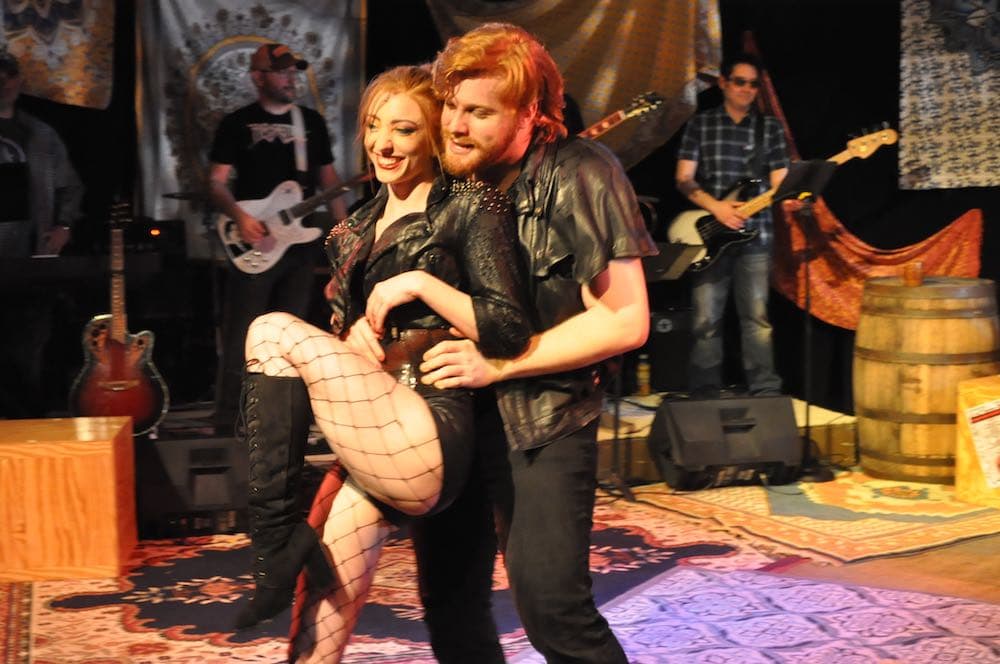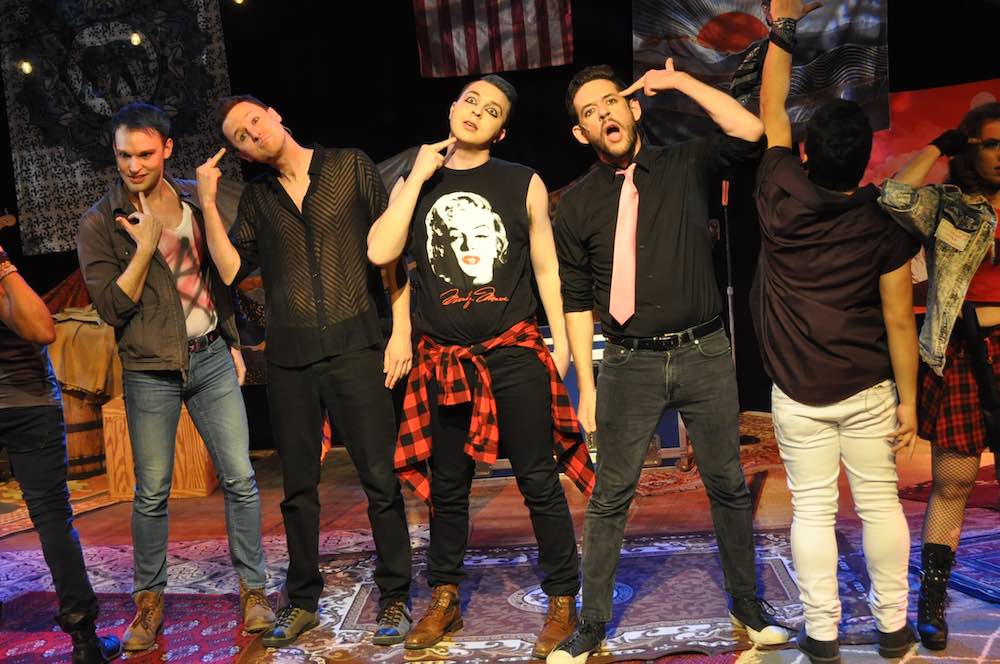Dominion Stage has given this rowdy, irreverent, and rollicking rock musical a remarkably woke production that is as rousing as it is reflective and as satiric as it is unsettling. Set in 1800s America, the show with music and lyrics by Michael Friedman and book by Alex Timbers is based loosely on the life of Andrew Jackson, who is portrayed as a swaggering emo rock star.

An infectious sense of high-spirited freedom swept the stage and seemed to pump the audience on opening night. The talented young cast sings, plays, and dances us into a Hair-like countercultural frenzy with a pounding rock score. From the jump, the show is amped-up fun, yet it unfolds a true tale that’s dead serious, for what Bloody Bloody Andrew Jackson exposes is the ethnic cleansing of Native Americans carried out by the seventh U.S. president, whom it dubs, without much hyperbole, “America’s Hitler.”
The real Andrew Jackson was a slaveowner who as president implemented a ruthless policy that forced Native people from the Southeast to journey westward past the Mississippi to “Indian territory.” During this disgraceful chapter of U.S. history, which Native Americans named the Trail of Tears, thousands of Cherokees perished.
To give some idea of this guy’s character, Donald Trump is a huge fan. He had a portrait of Jackson hung in the Oval Office.
As a musical, Bloody Bloody Andrew Jackson has all the makings of a crowdpleaser: a great emo–meets–Green Day score, profanity-spiced comedy, artistic licentiousness, a sexy romance, South Park–ish audacity. As Dominion Stage’s ebulliently anarchic production proves, Bloody Bloody Andrew Jackson is exuberantly entertaining—even as its treatment of Jackson’s despotic “Indian Removal” campaign can be viewed as a grim lampoon of the racist and autocratic values that continue at the core of this country’s white nationalist populism.
“I’m federal Metamucil; I’m here to unclog the system,” Jackson boasts in the script. “The people are not going to stop Andrew Jackson from doing what Andrew Jackson knows the people want.” Act One ends with Jackson vowing, “Gonna listen to the people’s voice!” By “the people,” of course, he means angry white frontiersmen and other anti-elite types he riles up. He decidedly does not mean Indigenous people—whose depiction in this very musical has come under fire.
The controversy goes back to the oughts when, as Politico reported, New York’s Public Theater mounted Bloody Bloody Andrew Jackson without consulting anyone in the Public’s own Native Theater Initiative—and Native Americans protested the show fiercely. When in 2014 a theater company in Minneapolis staged a production, Navaho Playwright Rhiana Yazzie, founder of the New Native Theatre, published a withering critique of the script. Over the years protests have prompted cancellation of several other productions. And shortly before this production opened, the local Angel Rose Artistic Collective (a Two Spirit–led group whose Siwayul: Heart of a Womxn I reviewed in April) called out Dominion Stage for “doing a vehemently anti-Native play that celebrates a genocidal hero of white supremacy.”
On opening night I asked Matthew Randall, president of Dominion Stage, whether he was aware of this ongoing controversy before programming Bloody Bloody Andrew Jackson, and he told me yes. Early in the rehearsal process, in fact, the company’s website posted an open letter from the director, Danielle Guy, titled “Is BBAJ a problematic show?” Confronting the show’s problems directly and describing what Dominion Stage would do differently, she wrote:
We have made great effort to find the balance between showing Jackson as a charismatic leader to the white frontiersmen of the 1800s, as well as the unapologetic racist whose decisions still have repercussions to this day.
…
The artistic team and myself have made sure to approach all portrayals of Native Americans in a way that is respectful. This was something that the original production got extremely wrong. And we intend to fix that with our production.
…
[Together with] a colleague from the Cherokee Nation…we dissected the entire musical, and identified what was unnecessarily problematic and what was not. We were then able to brainstorm solutions and different approaches to these parts of the script, while also staying within the legal limits of the show rights.We were also able to have a guest from the National Museum of the American Indian, and an Indigenous American herself, come to a rehearsal and watch the actors in a run of the show….
Any responsible assessment of Dominion Stage’s efforts must therefore evaluate not only the performances and stagecraft (which were outstanding) but also how effectively the production addressed that which is problematic in the material.
The first sign one gets of Dominion Stage’s eyes-wide-open intent appears in lobby showcases, where there are factual displays about “the Cherokee Removal,” historical personages involved, and the BBAJ controversy itself. The next such signal is a disclaimer in the program. As is common in theater these days, audiences are advised there will be “mature language, simulated violence…sexual innuendo, and other adult themes.” What’s unusual is the inclusion in that list of “offensive historical content.”
The company is inviting us, in other words, to take in this show with double vision: to appreciate the theatrical illusion without losing sight of the disturbing historical reality it’s based on. For any theatergoer with a social-justice conscience, this makes for a heightened experience of sensation and sensibility.

The laid-back set by Amber Kilpatrick is lit like a boho light show by Jeffrey Scott Auerbach and Kimberly Crago and looks like a pop-up venue for a hip-homey rock concert. The floor is a patchwork of carpets; the walls are hung haphazardly with flags and fabrics. On a bandstand stage right Music Directors Robbie Taylor (guitar) and David Weinraub (keyboards) conspire with David Smigielski (guitar), Christopher Willett (bass), and Tito Perez (drums) to blow the roof off the blackbox. (So loud is the band that at the beginning on opening night the mic’ed singers could not be heard.)
The 14 spirited cast members take dominion of the stage to an opening number, “Populism,” choreographed by Jolene Vettese with energy, urgency, and broad comedy. Their costumes by Anna Marquardt are an eclectic mix of punk and grunge in red, white, black, and blue. You’d think the American Revolution had come again, except the sardonic lyrics are about America’s own imperialism and colonialism:
It’s the early nineteenth century
and we’re gonna take this country back
for people like us.
The headliner is a charmingly cocky Matt Calvert as bad boy Andrew Jackson. Throughout Calvert dares us to decide whether we stan Jackson or can’t stand him. It is a complexly compelling portrait that suits the part perfectly.
In a flashback to Jackson’s boyhood, we see him with his father (Daniel Lakin) and mother (Brittany Washington) as they get killed before his eyes by Indian arrows. Thwing! Thwing! The stage directions say the deadly arrows fly in from the window, and as written the book suggests that the trauma of seeing his parents die like this is what fueled Jackson’s later genocidal obsession. But the incident is an insensitive invention by the book writer. That’s not at all how Jackson’s parents actually died, and audiences who don’t already know this would have no way of finding out from the script. Guy’s directorial solution is to play the scene so absurdly that it comes off as the fiction it is. As mother and father each hear the scripted Thwing! (the witty sound design is by Christopher Beatley), they goofily pluck an arrow that’s been stuck into a silly Styrofoam wig head stage left and mock-impale themselves. This directorial choice doesn’t correct the script’s historical inaccuracy, but it significantly dampens and downplays what’s ethnically defamatory in the book’s dramaturgy.

At a point, Jackson falls in love with the woman he will marry, Rachel, played by a sinuous and sultry Lindsey Litka in skin-tight black leather. They have a scene together that is part sexy-hot and part plain creepy. In the midst of full-on passion, the actors mime cutting their own forearms and bleeding together into a basin. They have a lovely, angsty song, “Illness Is a Metaphor,” which is about love as disease (and strangely echoes “The Word Is Your Body” in Spring Awakening about love as a bruise). The intense scene as performed by Litka and Calvert illustrates again how we are shown two things at once: an alluring young-love romance plus can’t-watch cutting.
As in a rock concert, there’s much up-close interaction with the audience, making sure they’re having a good time. Calvert is particularly good at working the crowd, as is the delightful Melanie Kurstin, who as Storyteller does so one-on-one from an audience member’s lap.
But a good time is not had by all. There comes the genocide of Native Americans, which is narrated in a musical number that as written is almost cutesy. It’s called “Ten Little Indians,” a winking reference to the children’s rhyme. Nothing about the song as performed in the Dominion Stage production is cute. It is closer to a dirge, and I caught that at least one insulting lyric line had been excised.

In the context of all the rock-out flash and fervor, it is the show’s solemn portrayals of Native Americans that most powerfully prompt reflection. Particularly impressive is Jennifer Rose as Black Fox, the historical Native American chief who was Jackson’s liaison to tribal leaders. Rose plays the role with an inner dignity and strength and a stillness that speaks volumes. Throughout there is no stereotypical costuming. Instead when actors speak as a Native character, they wear a patch displaying a tribal seal.
This simple symbol increases in eloquence. In a scene near the end, Andrew Jackson is alone onstage, presumably isolated in shame, while one by one all the other cast members slowly cross the stage wrapped in a blanket, presumably smallpox-infected, with a tribal seal patch attached. There is in that procession a reverence and respect for those who were genocided that did not come with the script licensed from Music Theatre International. It was found and created under Danielle Guy’s compassionate direction by a community of artists committed to keeping faith with the truth.
My forebears came from Norway and Germany; I cannot speak as someone for whom representation of Indigenous people in Amerian theater matters personally. I cannot say whether this Dominion Stage production rehabilitates or redeems a work that Native theater artists have legitimately long complained of. I can say, however, as someone who cares deeply about the moral life of American theater, that Dominion Stage’s zesty production of Bloody Bloody Andrew Jackson is a must-check-out showcase of accountable social-justice aspiration.
Running Time: One hour 50 minutes, including one intermission.
Bloody Bloody Andrew Jackson plays through February 15, 2020, presented by Dominion Stage performing at Gunston Arts Center Theatre Two—2700 South Lang Street, Arlington, Virginia. Tickets can be purchased online.
MUSICAL NUMBERS
ACT ONE
Populism, Yea, Yea! – All
I’m Not That Guy – Matt
Illness as a Metaphor – Matt, Lindsey, Danny, Michael, and Brittany
I’m So That Guy – All
Ten Little Indians – Hana, Meghan, Brittany, Melanie, and Becki
Vote for Jackson – All
Corrupt Bargain – Hana, Becki, Brittany, Melanie, Meghan, Daniel, Morgan, and Jennifer
Jackson Is a Loser – Hana, Becki, Brittany, Melanie, and Meghan
Rock Star – Erickson, Brittany, Matt, and All
Great Compromise – Lindsey and All
Public Life – Matt and All
ACT TWO
Crisis Averted– Erickson and Michael
Saddest Song – Matt, Michael, Melanie, Cristian, and Erickson
Second Nature – Michael and Meghan
Hunters of Kentucky – Band, Melanie, Michael, Matt, and All
PRODUCTION CREDITS
Executive Producer: Jennifer Lyman; Director and Producer: Danielle Guy; Music Directors: Robbie Taylor and David Weinraub; Choreography: Jolene Vettese; Fight Choreography: Craig Lawrence; Stage Manager: Carlie Smith; Assistant Stage Manager: Samantha Miren; Lighting Design: Jeffrey Scott Auerbach and Kimberly Crago; Sound Design: Christopher Beatley; Set Design and Master Carpenter: Amber Kilpatrick; Properties: Jacob Reese; Costume Design: Anna Marquardt; Hair and Makeup Design: Chanel Lancaster
CAST (in alphabetical order)
Meghan Bentley: Female Soloist and others; Cristian Bustillos: u/s Andrew Jackson, Monroe, and others; Matt Calvert: Andrew Jackson; Morgan DeHart: John Quincy Adams and others; Erickson Foster: Male Soloist and others; Danny Frumento: Van Buren and others; Michael Gale: Bandleader and others; Melanie Kurstin: Storyteller and others; Daniel Lakin: John Calhoun and others; Lindsey Litka: Rachel Jackson; Jennifer Rose : Henry Clay, Black Fox, and others; Hana Tawil: Lyncoya and others; Becki Turner: Cheerleader and others; Brittany Washington: Elizabeth Jackson and others
THE BBAJ BAND
Music Co-Director/Keyboards: David Weinraub; Music Co-Director/Guitar: Robbie Taylor; Guitar: David Smigielski; Bass: Christopher Willett; Drums: Tito Perez
RELATED:
“Isabella Star LaBlanc, who plays Tiger Lily in ‘Peter Pan and Wendy’ at Shakespeare Theatre Company, on why Native stories matter,” interview by John Stoltenberg.




